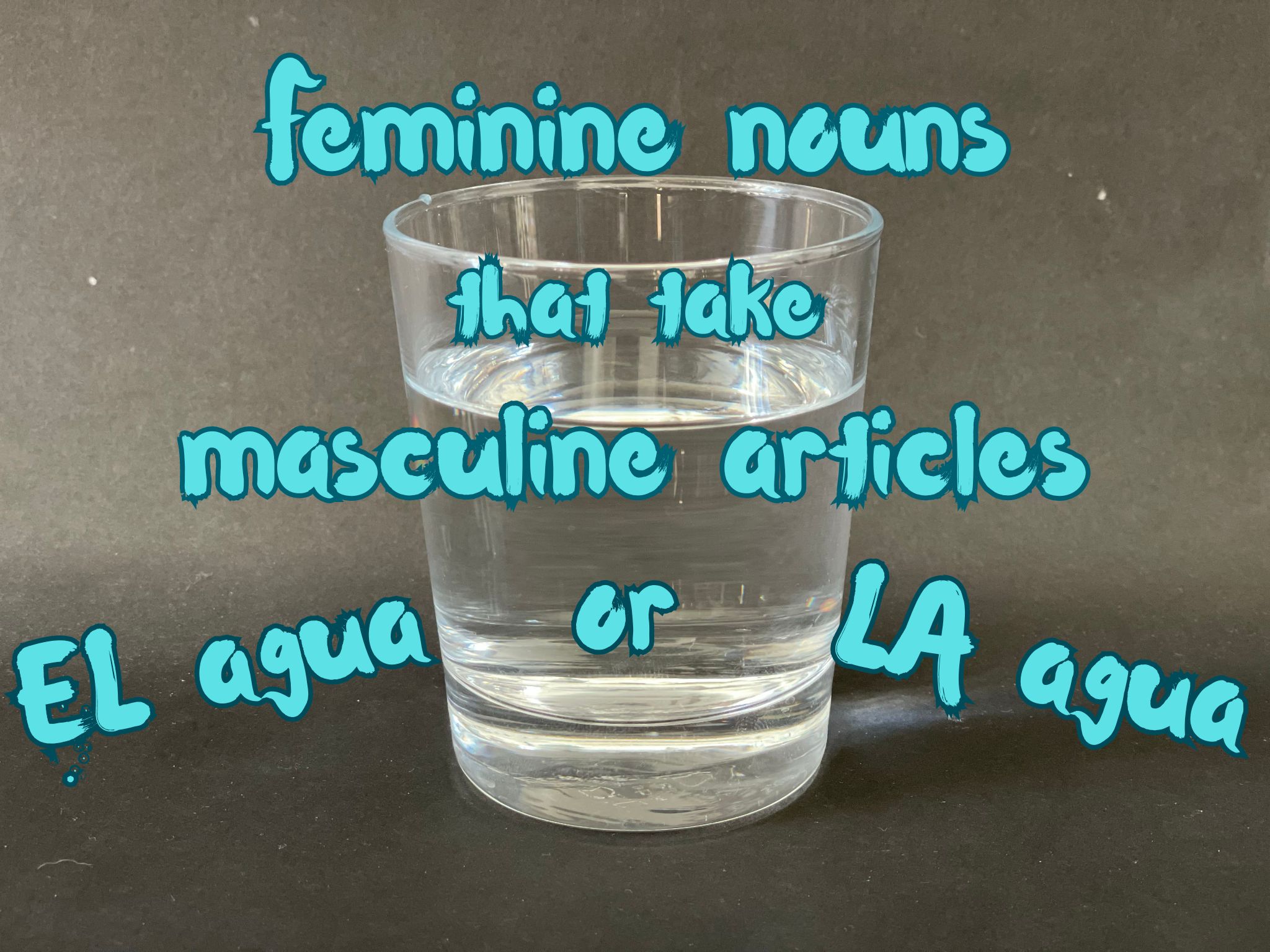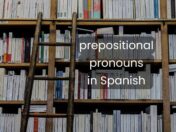Feminine nouns that take masculine articles: EL agua or LA agua, explained

Get our free email course, Shortcut to Conversational.
Have conversations faster, understand people when they speak fast, and other tested tips to learn faster.
More infoYou probably already know that Spanish is a language that takes gender very seriously when it comes to nouns, meaning that it has very well-established rules that affect accompanying words like adjectives and articles. But there are exceptions to every rule, of course! So in today’s post we’ll examine feminine nouns that take masculine determiners, learning whether we say, for example, el agua or la agua.
Let’s get started!
Spanish determiners: Gender rules
Before we tackle the exceptions, it’s important to understand the basic rules. In Spanish, all nouns are gendered and can be either masculine or feminine.
Moreover, nouns are often preceded by determiners, which are words that provide information about the identity, quantity, or specificity of the noun.
Determiners must agree in gender and number with the nouns they modify. The most common determiners are definite articles, indefinite articles, possessives, demonstratives, indeterminates, interrogatives, and exclamatives.
Determiners with some exceptions for certain feminine nouns
In a few specific instances, a feminine noun isn’t preceded by a corresponding feminine determiner, but by a masculine one instead. This exception doesn’t apply to all determiners, however; it only happens with definite articles, indefinite articles, and the indefinite determiners algún and ningún. But how come?
The rationale behind certain Spanish feminine nouns being paired with masculine determiners lies in phonetics and historical evolution. Basically, some feminine nouns beginning with a stressed a- sound take masculine determiners to avoid awkward vowel combinations that are difficult to pronounce.
Let’s take a look at how this works with each of these grammatical categories of Spanish determiners!
Articles
Articles play a pivotal role in signaling gender and number agreement. As a reminder of what articles are, a, an, and some are the indefinite articles in English, while the is the definite article. The equivalent indefinite articles in Spanish are un, una, unos, and unas, while the definite articles are el, la, los, and las.
As a general rule in Spanish, feminine singular nouns take the articles una and la.
For feminine singular nouns with a stressed a- sound in the first syllable, however, we use un and el instead.
A very common example is the feminine noun agua, meaning water, which leaves many Spanish speakers confused. So is it el agua or la agua? Well, since this noun begins with a stressed a- sound, it defies traditional gender norms by taking masculine articles. The correct form is el agua!
Let’s take a look at some other feminine nouns that behave in a similar fashion. We provide a full list of these nouns at the end of the lesson.
- El alma, Un alma – The soul, A soul
- El acta, Un acto – Minutes (of a meeting)
- El ala, Un ala – The wing, A wing
- El alba, Un alba – The dawn, A dawn
- El águila, Un águila – The eagle, An eagle
- El alza, Un alza – The rise, A rise
- El ancla, Un ancla – The anchor, An anchor
Keep in mind that this exception is made to facilitate pronunciation, so it only applies when the article immediately precedes the noun. If there is another word between the article and the noun, the feminine article is used.
- Tú y yo compartimos la misma alma. – You and I share the same soul.
- Le tomamos una foto a la gran águila que está en el aviario. – We took a photo of the large eagle that’s in the aviary.
- La primera alba del nuevo año nos recibió con un cielo despejado y colores vibrantes. – The first dawn of the new year greeted us with clear skies and vibrant colors.
- En la penumbra del templo, se podía percibir la mística aura que envolvía a los fieles en un silencio reverente. – In the half-light of the temple, one could perceive the mystical aura that enveloped the faithful in a reverent silence.
Likewise, we pronounce the final -s in the plural articles, so there’s no vowel clash like in the singular. We always use feminine articles with these nouns.
- Las ancas de rana son comestibles. – Frog legs are edible.
- Encontraron unas armas del siglo pasado en una caja. – Some weapons from the last century were found in a box.
- Las aulas están cerradas. – The classrooms are closed.
- Vimos unas aves muy bonitas. – We saw some beautiful birds.
- Moisés separó las aguas del Mar Rojo. – Moses parted the waters of the Red Sea.
Even when we use the masculine article, the words are still feminine. So regardless of whether we use el or la, or un or una, any other variable words in the sentence that refer back to the feminine noun, like adjectives or pronouns, need to be in their feminine forms.
- Esa es un arma antigua. El museo la adquirió en 1985. – That’s an ancient weapon. The museum acquired it in 1985.
- El aula la cierran de noche. – The classroom, it’s closed at night.
- Por aquí entra el agua fría y la resistencia la calienta inmediatamente. – The cold water enters here, and the element heats it immediately.
- El alga la usaron para preparar sushi. – The kelp, it was used to make sushi.
The noun arte is an exception to normal gender rules, being masculine in singular and feminine in plural.
- El arte moderno es único. – Modern art is unique.
- Las artes aplicadas involucran diversas disciplinas. – The applied arts involve diverse disciplines.
Exceptions that take the feminine articles
Some feminine nouns begin with an a- sound, but the stress is later in the word. In these cases, we can still use their singular feminine articles since the pronunciation doesn’t clash.
Yes, these two rules may appear to contradict themselves, but it all makes sense to native speakers based on how we pronounce the words!
You’ll notice that the words we present here all have three or more syllables, so we don’t put the stress the initial a- sound. Check out our post on syllabification to get a better understanding of where we place the emphasis in Spanish pronunciation. We recommend our post on Spanish accent marks as well, which also discusses how we put stress on different syllables.
Here are some examples of feminine nouns that begin with an a- sound, but which still take the singular feminine articles la and una.
- La hamaca, Una hamaca – The hammock, A hammock
- La harina, Una harina – The flour, A flour
- La abeja, Una abeja – The bee, A bee
- La habichuela, Una habichuela – The bean, A bean
- La altura, Una altura – The height, A height
Algún, Ningún
Algún means some or any, while ningún means none. These determiners take different forms based on the gender and number of the nouns they precede, with alguna and ninguna as the feminine singular forms.
These determiners also bend the rules a bit when used with feminine nouns that start with a stressed a- sound. We say “a bit” because it’s still valid to use the feminine forms, even though the masculine forms are more common.
These indefinite determiners are often confused with their pronoun counterparts ninguno and alguno. Although they are similar, the determiners ningún and algún always go before nouns, while the pronouns ninguno and alguno replace nouns. For more detail, we recommend our posts on the differences between ningún vs ninguno and on other clipped words in Spanish.
- ¿Hay algún hacha que pueda usar? / ¿Hay alguna hacha que pueda usar? – Are there any axes I can use?
- No hay ningún área operativa en este momento. / No hay ninguna área operativa en este momento. – There is no operational area at this time.
- No se ha posado ningún ave. / No se ha posado ninguna ave. – No birds have landed.
- ¿Tienes algún arpa en la tienda de música? / ¿Tienes alguna arpa en la tienda de música? – Do you have any harps in the music store?
Conclusion: Feminine nouns that take el and un
At this point you should know whether to use el agua or la agua, and why. Let’s just do a quick review of our lesson to wrap things up.
Today we learned that some feminine nouns don’t follow the usual rules when they begin with a stressed a- sound. In order to avoid an awkward clash of vowels, the feminine nouns in these cases take the masculine articles, as well as the masculine forms of the determiners ningún and algún.
These nouns are still feminine, so any other words like adjectives or pronouns still need to take feminine forms, even if the nouns themselves are preceded by el or la. These nouns also still take the feminine plural articles las and unas, since there’s no longer a clash of vowels in the pronunciation.
Since this phenomenon happens for reasons of pronunciation when a stressed a- sound would normally follow the a sound of la or una, it doesn’t apply to nouns that begin with an unstressed a- sound whose stress is on a later syllable. As a general rule, this means that two-syllable words starting with a- take the masculine articles, while longer words take the feminine articles.
To conclude, we’ll leave you with a comprehensive list of the feminine nouns in Spanish that take the singular masculine articles.
| Feminine noun, singular | Feminine noun, plural | English |
| el acta | las actas | minutes (of a meeting) |
| el agua | las aguas | water |
| el águila | las águilas | eagle |
| el ala | las alas | wing |
| el alba | las albas | dawn |
| el alga | las algas | seaweed |
| el alma | las almas | soul |
| el alza | las alzas | rise |
| el ama | las amas | housewife, mistress |
| el anca | las ancas | haunch, rump |
| el ancla | las anclas | anchor |
| el ánima | las ánimas | soul in purgatory |
| el arma | las armas | weapon |
| el arpa | las arpas | harp |
| el aula | las aulas | classroom |
| el aura | las auras | aura |
| el ave | las aves | bird |
| el habla | las hablas | speech |
| el hacha | las hachas | axe |
| el hada | las hadas | fairy |
| el hambre | las hambres | hunger |



